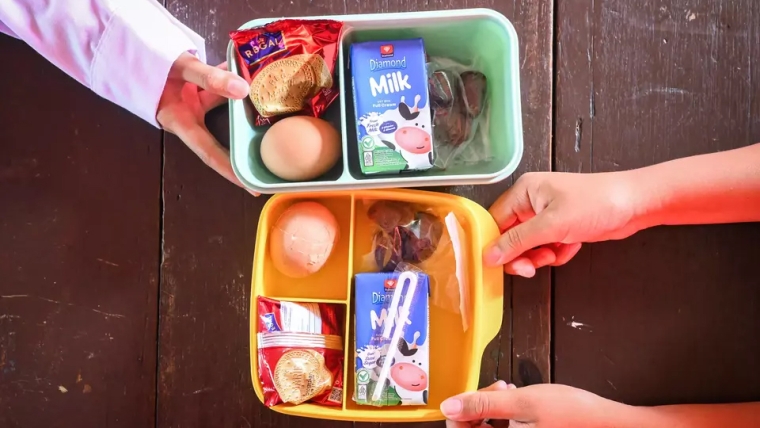
Content supplied by Rabobank.
A new Indonesian school milk programme is expected to significantly increase the country’s total dairy consumption, creating opportunities for New Zealand and other global dairy players, according to a new report by food and agribusiness banking specialist Rabobank.
In the report Indonesia’s new school milk programme could nourish minds and global dairy markets, Rabobank says the recently-elected Indonesian government has introduced a range of policy measures with the potential to transform the country’s dairy supply chain.
“The centrepiece of its policy is the Nutritious Meals Programme, which aims to combat malnutrition and promote healthy eating among school children,” report author RaboResearch senior analyst Michael Harvey said.
“A key feature of this programme is to provide food, including milk, to 60 million students on every school day by 2029. RaboResearch estimates the total milk required at full implementation could surpass 2 billion litres.
“This estimate is based on an anticipated 83 million recipients accounting for school absenteeism, lactose intolerance, and an average serving size between 125ml and 200ml.”
The report says the ambitions behind Indonesia’s school milk programme have the potential to significantly increase Indonesian demand for liquid milk.
“The majority of milk consumed by Indonesia’s 280 million people in 2024 was imported, with domestic production estimated at 900 million litres, and an additional 2.5 billion litres (liquid milk equivalent) imported,” Mr Harvey said.
“To meet the growth in demand that will result from the programme, the government and industry plan to significantly increase the national dairy herd.”
As the rollout of the programme gathers pace, the report says, investment across Indonesia’s dairy sector is expected to accelerate, with more pronounced impacts on the global sector.
“For Indonesia to achieve its ambitious milk supply growth targets and accommodate the considerable number of dairy cattle needed, it will need to scale up both live cattle supply and the local dairy supply chain,” Mr Harvey said.
“This will include need for feed genetics, farm infrastructure and farm management skills to support the expanding local industry.”
“And overall, we expect global input players and dairy companies to benefit.”
While the school milk programme is likely to increase domestic supply and provide a tailwind for local Indonesian dairy players, Mr Harvey says, Indonesian dairy import demand is also expected to rise.
“Fundamentally, RaboResearch expects Indonesia to remain a net importer of dairy and anticipates that annual import volumes are likely to grow over the medium term.” he said.
Opportunities for New Zealand
Mr Harvey said New Zealand has grown its market share in Indonesia’s skim milk powder market in recent years, and the new programme could create opportunities to further lift dairy exports to Indonesia.
“Even before the announcement of the school milk programme, Indonesia was viewed as a dairy market with long-term high growth potential and, in 2020, Fonterra announced plans to further invest in Indonesia by enhancing its blending and packing capabilities,” he said.
“This investment has paid dividends with New Zealand’s market share of Indonesian milk powder exports growing rapidly from 11% in 2019 to 39% in 2024.”
“And this significant recent growth places New Zealand in a strong position to capitalise on the expected lift in Indonesian dairy demand over the years ahead.”
“Clearly Indonesia is an important trading partner for New Zealand dairy and will continue to present growth opportunities moving forward.”
Indonesia’s milk powder imports, market share by exporter, 2019-2024
“Historically, New Zealand had a large dairy cow/ heifer export business, exporting on average 90,000 head annually. However, a ban was implemented in 2023 following several maritime incidents,” he said.
“Public consultation on a repeal of the ban is currently underway and, should this ban be reversed, it’s likely Indonesia would provide a viable market for New Zealand live dairy exports.”
RaboResearch Disclaimer: Please also refer to our disclaimer here for information about the scope and limitations of the RaboResearch material provided in this media release.
4 Comments
Milk in schools to help the youngsters.
What a fine idea, about 60 odd years after NZ. And then we knew better
Was great when it was cold, not so good after sitting in the sun..
Yes, Rastus, showing how 'grown up' we are with that memory.
But under nutrition is a significant developmenal issue for children in that part of the world, including Timor-Leste.
And yes, given my experience in Timor-Leste, there are many fundamental challenges to be addressed to establish effective, sustainable, domestic milk production.
Remember 'milk biscuits'? I recall getting samples at school (bloody awful) as they were going to save the world form starving etc.
An opportunity to be revisited by fonterror perhaps? No fridge required.
China Version 2.
Indonesian government made very clear a condition of supply will be to assist the development of their own dairy industry through supplying breeding stock and technology.
We did the same thing in China, they overshot on local production, international pricing fell on loss of demand, local farmers struggled, international prices recovered.
Roller coaster ready to go again.

We welcome your comments below. If you are not already registered, please register to comment
Remember we welcome robust, respectful and insightful debate. We don't welcome abusive or defamatory comments and will de-register those repeatedly making such comments. Our current comment policy is here.